Women Demand Equality in Jiu-Jitsu
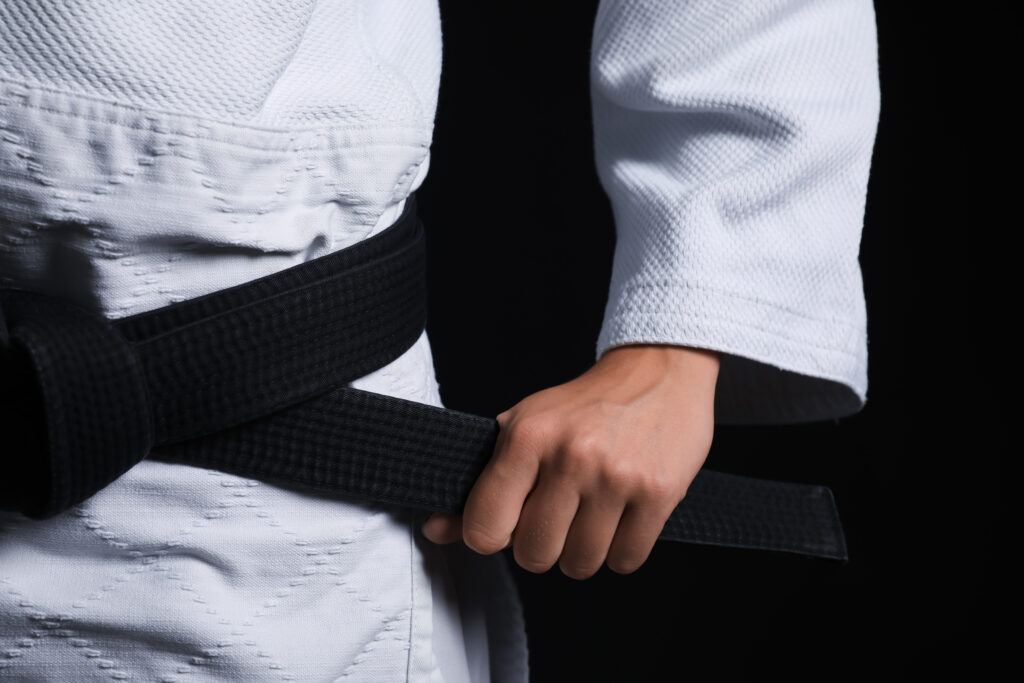
Earlier this month, prominent female athletes and female coaches took their disapproval of the current situation of women in competitive Brazilian Jiu-Jitsu to the public arena via social media channels. With huge followings, 50K, 130K, their demands for long-due basic gender equality in the sport is receiving an overwhelming amount of support that may just exert enough pressure to catapult effective change
Featuring interviews with competitors, Claire North, Danielle Walker and coach Emi Miller.
Story by Evelyn Sutton.
As a community, are Jiujiteiras finally ready to organize and unite in a transformative grassroots activist movement that may very well include boycotting promoters and tournaments that don’t equally showcase, provide equal pay, competitive opportunities and weight class divisions for both women and men in Jiu-Jitsu? If you look through the social media profiles of many prominent and influential Jiujiteiras in our community these days, it definitely appears so.
The dark night of feeling hopeless in the shadows, doomed to remain marginalized, pretending to be satisfied with nothing more than a side-show, novelty status, while inefficiently fighting for basic equality is starting to feel the vibrant rays of a bright sunny day for women’s Jiu-Jitsu rising on the horizon.
Following the IBJJF FloGrappling Grand Prix, on Oct. 28th, which featured a men’s division and a women’s division with four athletes on each side and three high level superfights that did not include any women, competitors shared on social media their frustrations regarding the limited amount of opportunities promoters, events and Jiu-Jitsu organizations in general are still extending to women. Nathalie Ribeiro was one of the first athletes to voice her concerns and the amount of likes, shares and comments her Instagram post is receiving clearly reflects that fans of the sport, who support these events, share her frustrations and widely want an equal and more inclusive treatment of women in Brazilian Jiu-Jitsu.
“The year is 2022 and we still struggle with the fact that women have no equality in Jiu-Jitsu sports. We still see big Jiu-Jitsu federations paying men and not paying women in tournaments, or pay less for women compared to men. We still see super fights having 8 matches and only one or two women matches and the biggest grappling tournament having only two women divisions with less competitors compared to men divisions and quantity. The media posts more about men and make the spectators only want to watch the men division. They say “we post what the people want to see” HOW COME THEY WILL SEE HOW MUCH WE, WOMEN, ARE GREAT COMPETITORS AND FIGHTERS IF YOU DON’T SHOW US TO YOUR SPECTATORS???” – Nathalie Ribeiro (tatawribeiro)
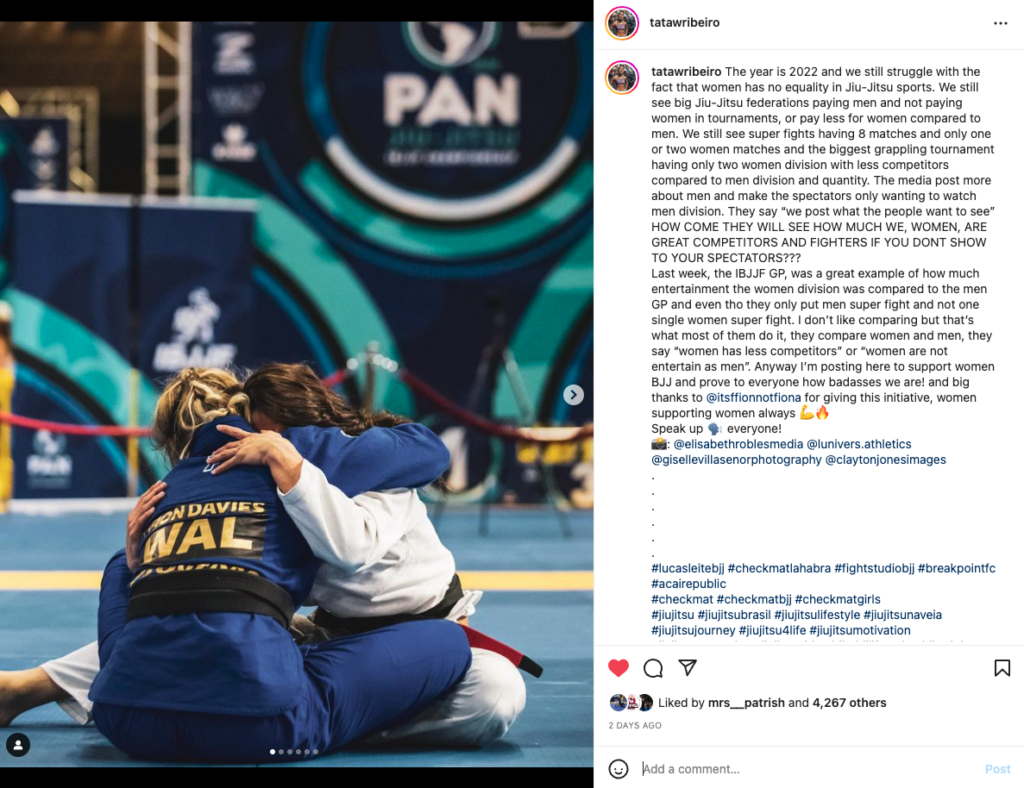
Since then, more female influencers in our community, from coaches to athletes and Jiujiteiras in general are coming forward to make their displeasure about how female athletes are treated in the Jiu-Jitsu competition environment known, demanding urgent and definitive change.
“Not having women on your shows at this point is just plain embarrassing. Having just one match on the undercard as some sort of ‘novelty’ is embarrassing. Having just two divisions is embarrassing. Men being silent on these issues is embarrassing. Believe in the potential of women’s Jiu-Jitsu. We will be in a never ending loop if no one takes the risk and steps forward.” – Ffion Davies (itsffionnotfiona)
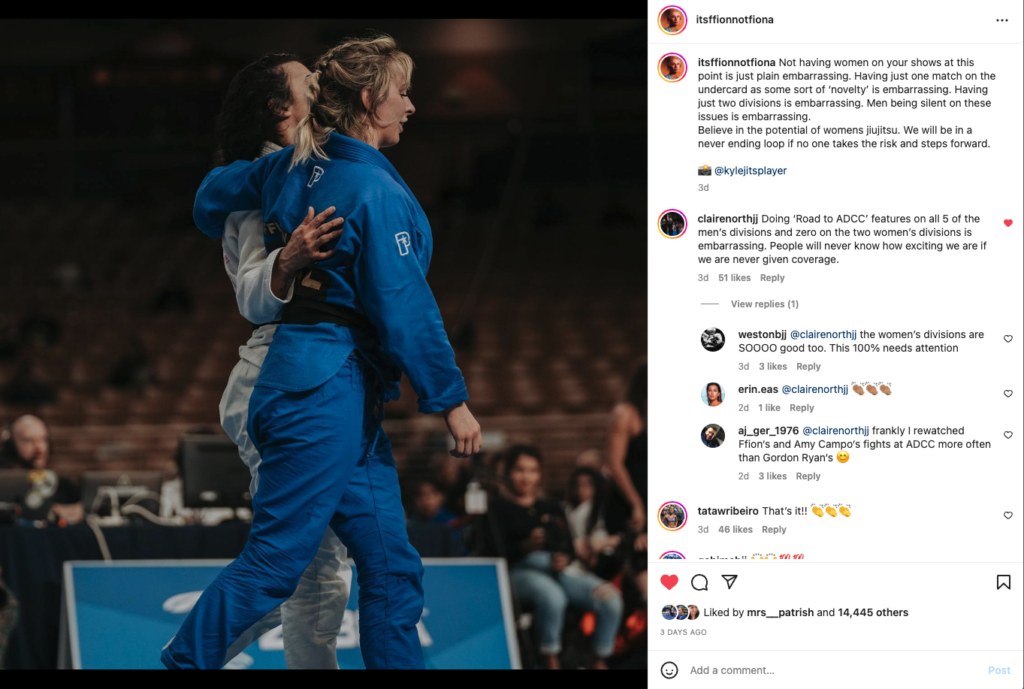
“Doing ‘Road to ADCC’ features on all 5 of the men’s divisions and zero on the two women’s divisions is embarrassing. People will never know how exciting we are if we are never given coverage.” – Claire North (clairenorthjj)
“The world needs to step it up for women’s Jiu-Jitsu. We have to keep fighting for change! Women and MEN put pressure on the promoters, put the topic out there, let’s make a difference!” – Danielle Walker (D.walkerbjj)
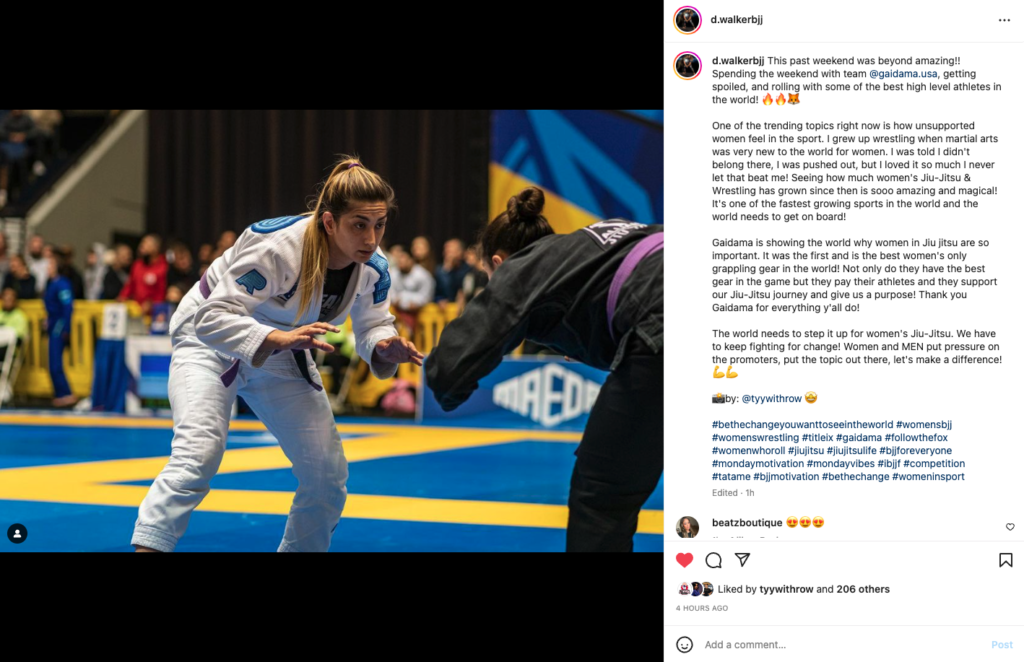
What Women Want
Unlike the movie with Mel Gibson, What Women Want, that came out in 2000, you don’t have to be a mind reader to figure out what the demands are from the female athletes in Brazilian Jiu-Jitsu. Basically, women are asking for three very specific things when it comes to competitions:
- Equality of Weight Classes for male and female divisions
- Equality of Pay for male and female athletes
- Equality of Opportunities for male and female athletes
Pretty simple. What’s the problem, then? Let’s break it down.
Weight Classes:
Even though female enrollment at Brazilian Jiu-Jitsu gyms continues to skyrocket every year, most Jiu-Jitsu promoters claim there just aren’t enough women signing up to compete at their events for them to be able to offer the same weight classes options as they do for the men. Have you considered the reason there aren’t enough women signing up for your event is because you don’t offer enough weight classes to accommodate them? Offering only one or two weight classes is too restrictive and not everybody can or is willing to cut or go up in weight just to be able to compete.
Equal Pay:
Historically, men’s sporting events receive more promotion, better marketing and time in the spotlight. It’s no wonder they end up getting more attendance, more ticket sales and as a result, better sponsors. But not highlighting women’s matches in Brazilian Jiu-Jitsu, not including women in the card, treating women as an after-thought and not doing a good job promoting female athletes, isn’t helping anyone. If the audience doesn’t know who the women competing are, and the fact that they even exist, how do you expect they will turn out to support them?
Fans utterly agree that women’s Jiu-Jitsu matches are often more exciting and explosive than the men’s, which makes for a more entertaining show. From a technical perspective, women continue to push the envelope and evolve the sport, arguably even faster than the guys, partially due to the many uniquely female obstacles women are faced with on the mats and have to technically figure out how to overcome on a daily basis.
Sponsors are almost never approached by promoters to support female matches and events. If competitive organizations start putting in towards the women the same level of dedication they invest when planning events for the men, and present viable options for investment, more sponsors would be willing and eager to support their initiative, making prize money available to promoters who are facilitating opportunities to the fastest growing segment in Brazilian Jiu-Jitsu, women.
More Opportunities:
Women are in Brazilian Jiu-Jitsu to stay. Promoters who fail to include female matches in their events, and fail to provide equal opportunities for female and male athletes to compete at the same level will become irrelevant and obsolete. It’s just a matter of time.
Women Supporting Women: It’s Our Responsibility
Danielle Walker is a brown belt out of San Antonio, Texas with GF Team under Professor Bruno Alves. Danielle has been training Brazilian Jiu-Jitsu for 5 years but she grew up wrestling and has over 20 years of wrestling experience. She is also a wrestling coach in San Antonio at Black Label Jiu-Jitsu.
An active competitor in the BJJ circuit, Danielle has won multiple championship titles in both gi and NoGi at IBJJF Master Worlds, Worlds and Pans.
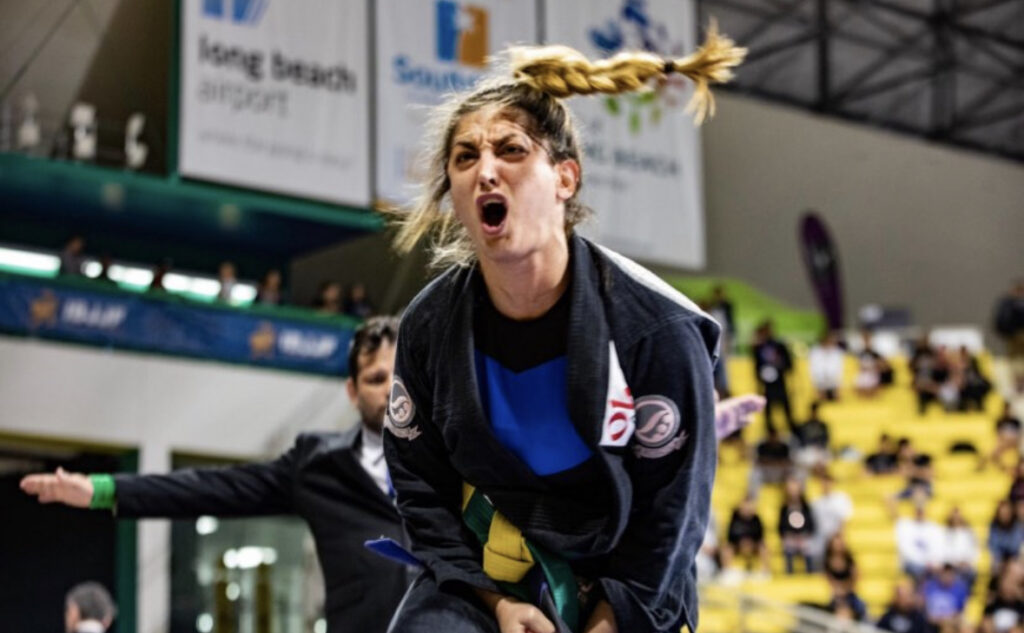
A Gaidama sponsored athlete, Danielle has recently returned from an open mat and photoshoot to promote new designs the female centric fightwear collection has just launched. A Jiujiteira owned company, Gaidama is currently one of the few brands in Jiu-Jitsu that prominently invests and financially supports female athletes.
“The Gaidama open mat and photo shoot was really cool, there were about 10 of us, brown belt and black belt female athletes who are sponsored by Gaidama. They paid for the full trip, they really spoiled us, and we got to roll with some of the best women in the world.”
A lack of financial support for female athletes is a problem in our community that causes women to have less opportunities than men to compete and earn a living as a professional athlete and coach.
Gaidama is a company determined to change that and make a difference for women in Jiu-Jitsu, not only because it focuses on developing beautiful, high quality fightwear specifically designed for the female body, but also because of the generous sponsorship programs it offers female athletes. Before Gaidama, Danielle had to run GoFund me campaigns to raise enough money to compete at the big tournaments.
“I’ve been with Gaidama for over two years and they are amazing. They fully support us. They pay us to compete, they pay us a commission for sales we generate and all of that helps so much, especially for somebody like me who doesn’t make a lot of money. I live for Jiu-Jitsu. I’m a competitor, I’m a coach and all my money goes into competing. By having a sponsor like Gaidama, it financially helps me and also motivates me to keep going because I know I have a sponsor who believes in me and sees me as a champion.”
As women who train and love Brazilian Jiu-Jitsu, the responsibility of supporting women in the sport falls on us. Whether you are an active competitor or not, you are part of a moment in time when we have the chance to step-up and together, change the status quo.
We can not continue to remain silent, waiting for somebody else to take on the struggles that only affect us. As a community of Jiujiteiras, we are strong, and nowadays there are more than enough of us training and coaching to create a powerful, transformative movement that can not be stopped or ignored.
“If we use an activism style approach to demand change we can absolutely force a difference in our sport. It’s crucial that today’s generation of Jiujiteiras stands up so that tomorrow’s generation has a better future.”
Emi Miller
The Root of the Problem
Regarded by many as the flagship of competitive Brazilian Jiu-Jitsu, women weren’t allowed to compete at IBJJF until 1985, however it wasn’t until 1998, that women were officially included and women’s divisions created for the event, 2 female divisions were offered, while the men had 50 divisions to choose from. The inclusion of women didn’t happen organically. It took one very determined lady and her group of fierce Jiujiteiras to make it happen.
Yvone Duarte, the first woman to earn a black belt in Brazilian Jiu-Jitsu, she is now a coral belt, (read her story) was pivotal in getting women the opportunity to compete at IBJJF events. Yvone and her fellow Jiujiteira friends submitted a formal request to Rickson Gracie, president of the Jiu-Jitsu Federation in Rio de Janeiro at the time. Rickson forwarded their request to Marcelo Behring, brother of Sylvio Behring and secretary of the Federation and asked him to set up a meeting with Master Hélio Gracie, when Hélio granted their request. The ladies went on to organize the very first women’s Brazilian Jiu-Jitsu tournament in 1985. The event was a success but although the women had authorization from Hélio Gracie to compete, female divisions weren’t yet officially part of IBJJF. Not satisfied, Yvone, a blue belt then, started a grassroots campaign to get the women’s division sanctioned by the Jiu-Jitsu Federation and officially become part of the main BJJ competition circuit.
“Nowadays, we look back and we can see what a turning point that was for women in Brazilian Jiu-Jitsu. It forever changed our access to the opportunities we have in the sport. It was a milestone”, says Yvone.
And now a new generation of Jiujiteiras is being called to expand what Yvone and her friends began.
“Once the competition playfield is a little more even, more women will be inspired to compete.”
Emi Miller
Danielle Walker goes into detail:
“I watched the IBJJF GP that just came out. They had a men’s division and a women’s division. When you watch the matches, the women’s matches were by far more entertaining and explosive, the Jiu-Jitsu was amazing and the audience was at the edge of their seats, glued onto the women’s division. Then you watch the men’s matches, and not taking anything away from them but this GP in particular, the guy’s matches were much less entertaining, even a little boring. IBJJF needs to step it up for women. We are putting everything on the line, performing better than the men and we are not getting the same level of recognition or respect.”
Not only do we need to end the discrepancy regarding the difference in pay for women versus men, but we desperately need to pressure tournaments to open up more divisions for women, particularly heavyweights.
“The lack of appropriate divisions for women is a joke. I have to make a 20lbs cut to go down to heavyweight and if I don’t make weight cut, I’m fighting girls that are 50 to 100lbs heavier than me. So, I do the weight cut every time without complaining because that’s what’s currently set in stone but it shouldn’t be like that. We should have more divisions, just like the men do. Even ADCC, they only have two women’s divisions, and that makes no sense, it’s just crazy to me. Women’s wrestling and women’s Jiu-Jitsu are the fastest growing sports in the world right now, it’s a fact, the stats are there to back it up so why are these Jiu-Jitsu organizations ignoring that? Why not open up these divisions, open up these opportunities for us?”
With odds stacked against her simply for being a woman, Danielle even felt the pressure to start her own promotion just to be able to compete with the same advantages extended to men in BJJ:
“I even thought of starting my own promotion just to highlight women’s Jiu-Jitsu but as an athlete, I shouldn’t feel that I have to do that. The promoters who are already in our community, they need to do that. We’ve been fighting and demanding these changes for a long time now, and we shouldn’t have to fight for basic equality in Jiu-Jitsu forever.”
Respect our Rank
Emi Miller has been training Brazilian Jiu-Jitsu for 7 years. She is a brown belt out of 10th Planet Chino Hills in California. One of the lucky ones, she got her start at a gym where she felt encouraged and supported by her male coaches, including Professor Jeff Willingham, who is still her coach today. That positive experience set up her expectations that women are treated just like the men are in Brazilian Jiu-Jitsu, with the same level of respect and the same opportunities to grow in the sport.
You can imagine just how disappointed Emi was when she discovered that wasn’t the case everywhere. Due to a discontinuation of the program she was in, Emi had to switch gyms and in the process of visiting other training facilities, she quickly found out the real situation for most women in Jiu-Jitsu, in many other gyms, women were seriously struggling with inclusion and not receiving the same learning and leadership opportunities as the male students.
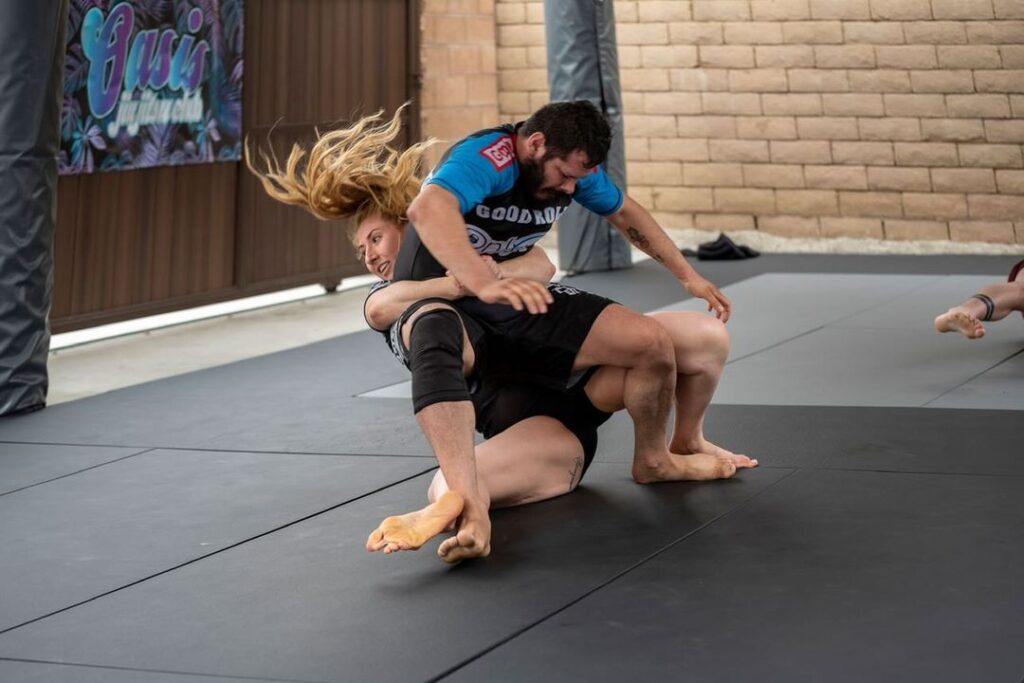
Emi is now happy to be back in the 10th Planet family, where she was able to really get involved. She teaches at the gym and runs Oasis Jiu Jitsu Club in Orange, CA. Emi feels strongly about putting a big spotlight on the importance and value of female leadership as well as female business ownership in Brazilian Jiu-Jitsu.
Unfortunately the problem not only continues to rear its ugly head at gyms that refuse to evolve into an environment that promotes inclusion, or at high level female athletes feeling discriminated against at major tournaments but the problem also extends to female coaches. Being blatantly disrespected as a coach is the ultimate offense to someone who dedicates their life to the betterment of the competitors under their care.
“This was the fourth time this situation has specifically gone down exactly like this and I just snapped. The level of disrespect towards female coaches is ridiculous to me. This problem originally got my attention during Naga Upland that happened about two months ago when we took our team 10th Planet Chino Hills to compete and I was asked to coach. One of our white belts makes it to his final match, I am clearly the one coaching him, he loses pretty quickly and at the end of the match, I put my hand out there for the winning opponent to shake, and he just completely ignores me, and walks right past me.”
Then, in bitter déjà vu, the exact same type of situation happens again:
“This past weekend, I was coaching at Submission Only Series, which I have to say, is a huge supporter of women in Jiu-Jitsu. They do a great job including women in their cards and even had a female referee on all of their matches. I don’t want anyone to misconstrue that what happened had anything to do with the event, what it has to do with is the distorted perception of women in this current male-dominated, ego-driven culture of Brazilian Jiu-Jitsu. My Professor had a match and he asked me to coach, so I went up to do so and Doyle ended up showing up as well. Doyle was standing next to me and both of us were yelling instructions but, just like before, I am the one clearly sitting on the coaches chair. After the match, the opponent walks straight up to Doyle and shakes his hand. Once again, I stick my hand out and he doesn’t even look at me, walks away and I decide to just let it go.”
To add insult to injury, the next match Emi coaches at the same tournament, she doesn’t get ignored by the opponent but by their coach, who you think would know better.
“Then Donna Gonzales had a match immediately afterwards and she brought one of her blue belt students to help her because I believe no one else was available that day. She saw me right before she was about to go, so she asked me if I could corner her. I am happy to do so, I’ve looked up to her at 10th Planet for a very long time, ever since I was a white belt, and I felt honored to be able to support her in that moment. It’s now the end of the match and Donna’s opponent who won is adrenaline pumped celebrating her victory, when her coach walks over to our corner and again, I was sitting in the coaches chair, I was yelling instructions to my fighter and he chose to shake the men’s hand next to me, who is a blue belt, and completely ignored me. I just thought, “Wow, dude. I wildly outrank this kid. You’re going to shake his hand instead of mine?”
Emi had enough and decided to share her disturbing experience on Instagram:
“Is that your girlfriend?” “NO that’s my coach!” I’d like to publicly express my experience being a female coach in Jiu-Jitsu. I’ve noticed when I show up dressed cute with makeup on, people automatically assume I’m “someone’s girlfriend”. This weekend I coached two matches back to back at a lovely event. I found it very interesting that both times I clearly sat in the coaches chair, yelled technical instructions to my fighters, and stuck my hand out to the opponents after the match. Both times the opponents chose to shake the hand of the man standing next to me. But ignored and did not shake my hand. I found it very ironic that I wildly out rank one of the men whose hand was shaken instead of mine. For reference I am a brown belt, been training for 7 years and teaching for 5. What I found more interesting is how commonly it goes this way when I show up to a tournament to coach. I feel this needs to be addressed for any change to happen. This is not the 90’s, there are more women in combat sports than ever.”
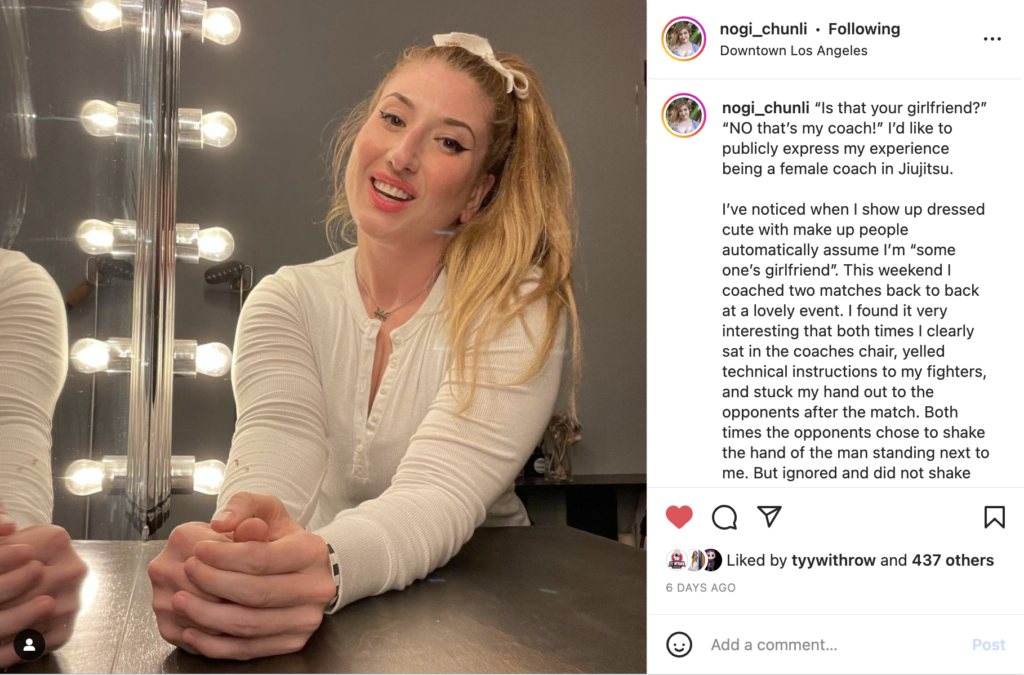
After sharing her experience, many other female coaches came forward with similar stories. Emi was surprised to find out how many professionals are dealing with the same gender based discrimination in Jiu-Jitsu:
“Man or woman, I am a brown belt. You will respect me. You will respect my rank.”
Emi Miller
Emi believes this is a two-part issue, inherent in general society but also specific to Brazilian Jiu-Jitsu where women just aren’t being recognized as leaders, upper belts or someone who should be commanding respect as a coach.
Where culture is concerned, Emi points out she has noticed there are some men who come to the gym not really understanding what Brazilian Jiu-Jitsu is, they are big doubters of what true technique can conquer, believing in the superiority of men versus women in the sport. She has a special term for them, she calls it making them “true believers”. A true believer is when they get to see the magic of Jiu-Jitsu, how a woman who is smaller can absolutely maul them with just technique.
“I can see it in their faces when they come in and see that I am leading the class. I can see it in their body language. They are uncomfortable and uncertain of my capabilities but I teach very detail-oriented technique and order of operations, after a few minutes there’s a bit of a change once they realize I actually know what I am talking about. Then it’s time to spar and that’s when I get to have my fun.”
And what should you do if you are feeling discriminated against at your gym? Seek out counsel from female leadership. If that is not available at your gym, talk to your Professor. Be honest, however, also be mindful of your emotions when trying to express what you are feeling. As a coach, Emi offers some practical advice:
“I feel like when it comes to communication women can get a little too hung up on emotions and if you go to your Professor very emotional, he might not know how to deal with you so instead of saying: ‘I am so terrible, everyone is beating me up, I cry coming to class.” You would just say something like: ‘I feel like I’m not understanding the technique all the way, X,Y and Z. What can I do to get better?’ Sometimes it’s the way we’re approaching them, if you do do this and it still doesn’t go the way that you feel would be beneficial for you, then seeking outside help would be the next step, if there continues to be an issue, then ultimately finding a gym where you will get the support you need will be your best option.”
Women In The Spotlight
Claire North, coach and competitor, who just won the bantamweight division at the latest installment of Medusa Female-Only Grappling said: “It’s nearly impossible for fans to get excited about people that aren’t promoted or featured. It’s a self-fulfilling process: they claim people don’t want to watch the women so they don’t give them the opportunities BUT THE ACT OF FEATURING US is what makes fans want to watch us!”
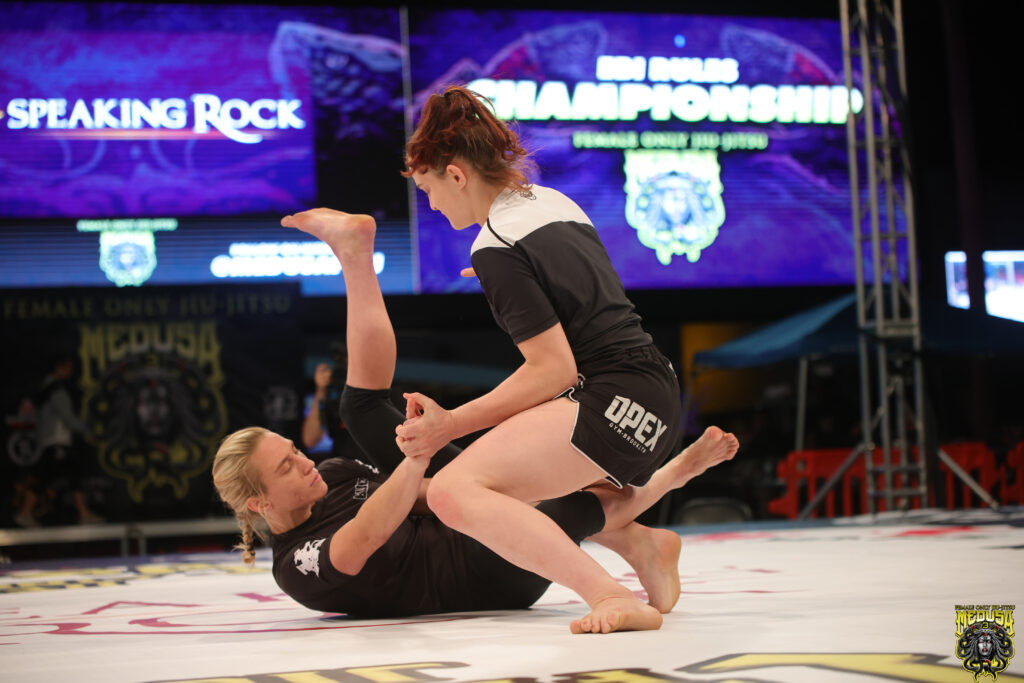
“If you have the ability as an organization to do features on people and we’re trying to make this a spectator-friendly sport, you have to give the spectators people to get behind and you do that by featuring them. If you don’t know how phenomenal Bia Basilio is for instance, and there are so many examples of amazingly talented women in this sport that have delivered incredible grappling matches that are never shown, if you never see them, you will never be excited to see them in the future.”
Claire is passionate when it comes to providing greater exposure for high level female athletes in BJJ and shares what happened at IBJJF Worlds this year, when the organization showed a video intended to honor athletes in the sport and only one female was featured, Kyra Gracie, who we admire and is an incredible trailblazer of women’s Jiu-Jitsu, however has been retired from competitions since 2014.
“At IBJJF Worlds this year, they showed this really beautiful tribute to past winners, a 10-minute video with some old and current competition footage, and there might have been maybe one quick little clip of Kyra Gracie while there must have been at least 5 dozen men showcased. Based on that tribute video, you wouldn’t even think that women do Brazilian Jiu-Jitsu.”
“I understand that there is a difference in the amount of men versus women who train in this sport, but if you never feature the women, there will never be more women. If you can’t see it, you can’t be it, that type of thing.”
When promoting an upcoming event, the lack of available content, profiles and footage on participating female athletes, can present a challenge.
“For a commentator preparing for an event or a journalist who is getting ready to write an article, the lack of content on female athletes becomes a self-perpetuating cycle. They can’t speak intelligently about how exciting this person is because nobody originally did, but we have to start somewhere.”
“As women, what we can do is be as exciting as we can be. Be so good they can’t ignore us.”
Claire North
To give women more opportunities for equal inclusive time in the spotlight, Claire offers a suggestion:
“IBJJF has done a lot for the sport. As an organization, they are undeniably the flagship of competitive Jiu-Jitsu but the fact that they are only doing the women’s finals matches on the finals day and not the semis is detrimental to women’s Jiu-Jitsu. Why not move the quarters of the men’s to the day before and have the semis for women and men on the same day? Part of the reason is because IBJJF has dedicated commentary for all of the matches on the finals day. Include the women’s semis and you triple the amount of women’s matches that would get dedicated coverage. And obviously, the majority of the time, the semis are more exciting. By the time you get to the finals, you are so reluctant to lose, you might play it safe. I just think this would be another way to provide better coverage, exposure, get more sponsors and create equality for female competitors.”
Men Who Are Doing It Right
As much as Jiujiteiras must come together in solidarity to support one another, we still need men advocating for women in Jiu-Jitsu, especially in the event promotions space, simply because women can’t get there if we are not there to begin with.
When it comes to inclusion and gender equality, Medusa Female-Only Jiu-Jitsu is paving the way and it would do well for other Jiu-Jitsu organizations to pay close attention and learn from them. Unlike most other promotions, events and organizations currently in the circuit, Medusa is the only one on the forefront of advancing and revolutionizing women’s competitive Jiu-Jitsu. A long time supporter of females in the sport, Eddie Bravo, founder of EBI, along with his business partner, Victor D’avila, have created what is positioned to become the ultimate competitive promotion for female athletes in Jiu-Jitsu, offering better pay, greater exposure, superior marketing and real opportunities for female athletes to showcase their proficiency on a major stage, as a matter of fact, the exact same stage as the men.
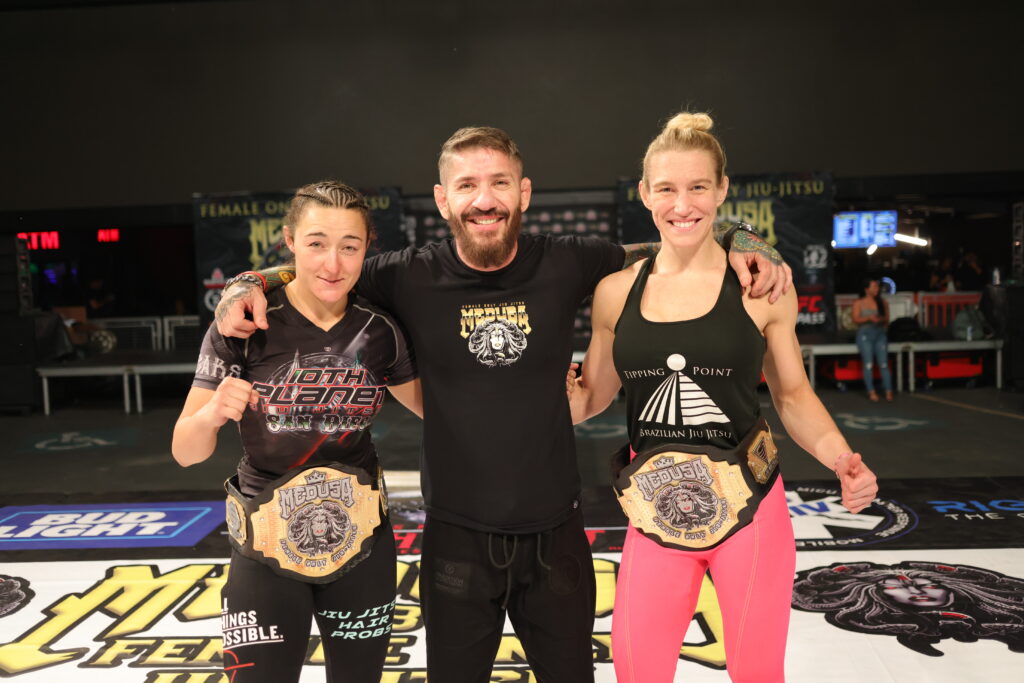
“We had our own night, we had the same amount of participants, to be honest, it felt like the same show on both nights”, Claire North said about the undistinguishable level of dedicated production given to both Medusa and EBI.
“We use the same stage, the same location, the same production team, the same marketing, and this time even the same weekend for both Medusa and EBI. There’s absolutely no difference. We don’t put the women on a smaller stage or don’t stream their matches on UFC Fight Pass. We want to give the ladies the same level of exposure and support as the guys. Our mission is to empower women in Jiu-Jitsu and give these athletes the recognition they deserve.” – Victor DaVilla, MasterVic, Medusa and EBI co-founder
“We’ve definitely come a long way since I grew up wrestling, there were no women, it was me wrestling against boys in boys’ attire, since then, we’ve come a long way, but we can go a lot further for sure.”
Danielle Walker
How to support women’s Jiu-Jitsu and do your part in creating effective change:
- Follow and subscribe to female athletes on social media. There are thousands of female black belts and brown belts from all over the world on Instagram and YouTube offering free high quality Jiu-Jitsu technique and lifestyle advice that directly benefits you as a woman who trains. Learn from them and share their content.
- Attend female-led seminars and pay top price for the instruction you are receiving. Purchase their merchandise, instructional videos and help financially support them just like you would any other Professor you admire.
- Whenever possible, look for gyms that have a female presence. Having women training at a gym says a lot about the environment. Encourage other ladies to try and help them through their journey, especially in the beginning, when it can be awkward and intimidating. Remember you had a first day in Jiu-Jitsu too. Be the friend you needed then.
- Support Jiujiteira Magazine. A female-owned business, we are the only media organization 100% dedicated to women in Brazilian Jiu-Jitsu and MMA and everything we do is done by volunteers – photographers, writers, designers, athletes, coaches – and contributors who generously donate their time, knowledge and talents for this magazine to exist because they believe and share our vision of elevating women in combat sports and growing our community. Read our stories, share our content, send us your stories as a woman in Jiu-Jitsu, financially support our work by sponsoring content and if you are a business owner, advertise.
- Get to know the women who compete at all the major Jiu-Jitsu events, gi and NoGi. Promote them, share their accomplishments, celebrate their journey. Everybody, men and women, in our community knows names like Gordon Ryan and Nick Rodrigues. There’s nothing wrong with celebrating the talented male athletes who shine in Jiu-Jitsu but what about the women? Can you name at least three accomplished female athletes who currently compete in BJJ? If you are a woman who’s been training for over a year and you can’t name one champion Jiujiteira in the circuit, you are part of the problem.
- Know your history and honor the female trailblazers in our sport. Without women like Yvone Duarte, Leticia Ribeiro, Leka Vieira, Sophia McDermott, we wouldn’t be here today. These ladies are STILL breaking barriers and fighting for equality in Brazilian Jiu-Jitsu. Support them.
- Step up and become a leader at your gym. Offer to help out with the kid’s classes and start a women’s only class if one is not offered. We need more women in positions of leadership to inspire and pave the way for others.
- Join female dedicated non-profit organizations such as Girls in Gis and The Mighty Dames, promote them, offer to volunteer, buy their t-shirts, stickers and attend their events. These organizations have been a life saving resource for women in Jiu-Jitsu – from donating gis, paying competition entry fees, providing education, paying for tuition, helping victims of abuse, and so much more – they function as a labor of love, without consistent financial support. We have an obligation to help their efforts.
- Support smaller local women-only tournaments such as ChickJitsu by attending their events and signing up to compete. Follow them on social media and share!
- Give preference to and purchase products from female-owned businesses in our community that are positively making a difference for women such as Gaidama, Fatale Jiu-Jitsu, SicChic, Alchemize and others.
- Support promotions and events such as Medusa Female-Only Jiu-Jitsu that are doing it right and elevating women, giving the same opportunities and placing female athletes under the same spotlight as male-athletes in our sport.
- Shamelessly boycott promoters, organizations, companies and events who continue to undervalue females and treat women in Jiu-Jitsu as nothing but a side-show. They don’t deserve your attendance, they don’t deserve your money and they certainly don’t deserve your support.
- Sign-up to attend female-only camps such as Grappling Getaways, Hips & Grips Jiu-Jitsu & Climbing Camps For Women and Roll Model Women’s Only Grappling Camp. Make friends for a lifetime, have an epic vacation, discover new adventures and learn Jiu-Jitsu from some of the very best Jiujiteiras in the world.
Read more:

Our printed magazine is full of extraordinary women with extraordinary stories, get your printed copy via mail today >


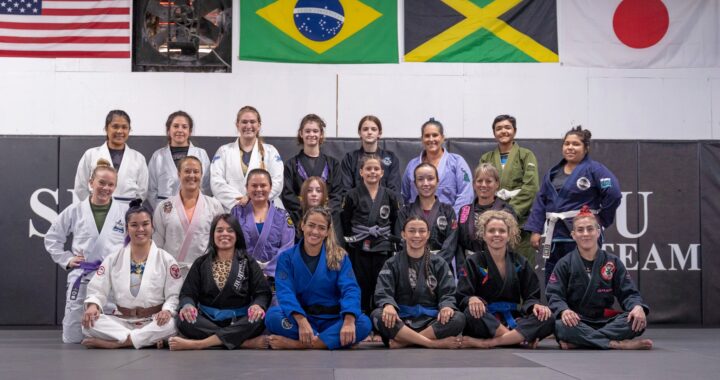 The Jiujiteira Sisterhood
The Jiujiteira Sisterhood  ADGS Rome: Jiujiteiras Shine in the Land of the Colosseum
ADGS Rome: Jiujiteiras Shine in the Land of the Colosseum 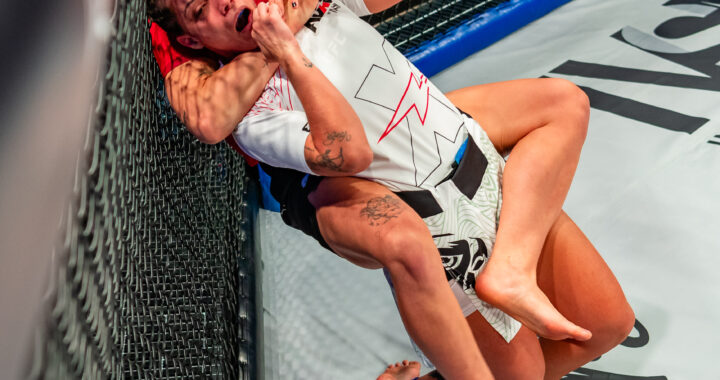 Ffion Davies: Unmatched Dominance at ADXC2
Ffion Davies: Unmatched Dominance at ADXC2 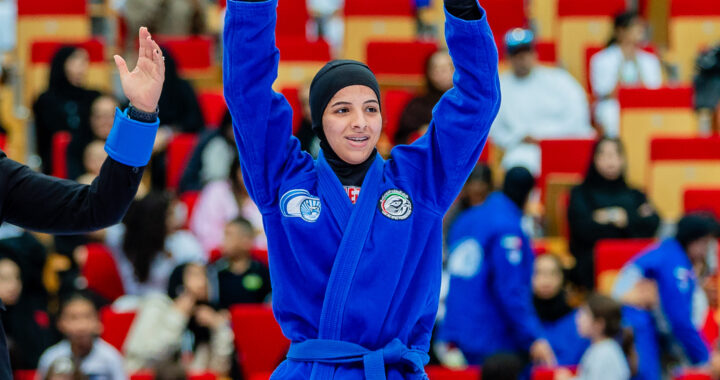 Winners of Mother of the Nation Jiu-Jitsu Cup are celebrated in Abu-Dhabi
Winners of Mother of the Nation Jiu-Jitsu Cup are celebrated in Abu-Dhabi 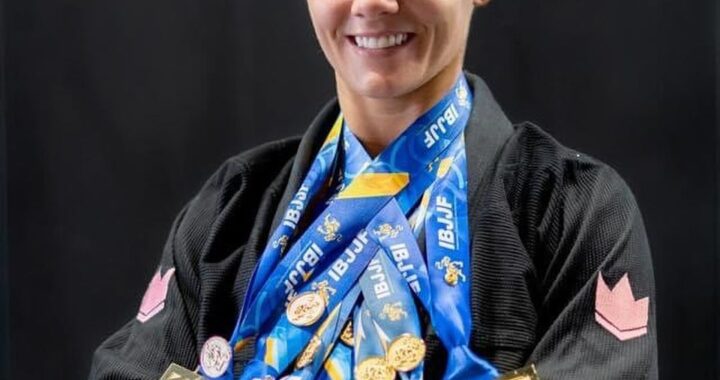 Maggie Grindatti Hangs Up the Gi: A Transition from BJJ Athlete to Fitness Coach
Maggie Grindatti Hangs Up the Gi: A Transition from BJJ Athlete to Fitness Coach 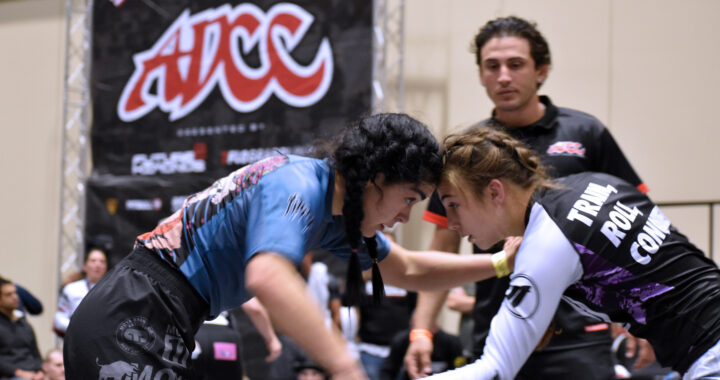 Jiujiteiras deliver intense battles and remarkable performances at ADCC Orlando Open
Jiujiteiras deliver intense battles and remarkable performances at ADCC Orlando Open 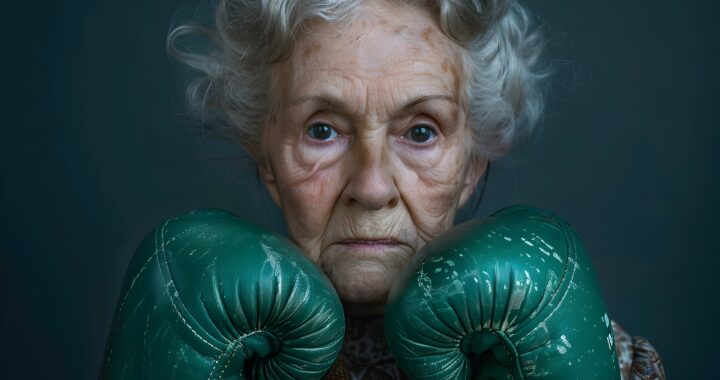 Father Time is Undefeated
Father Time is Undefeated 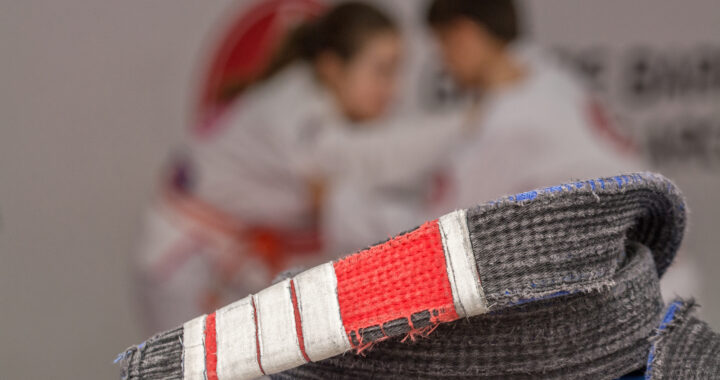 Advice in the Ranks- From White to Black
Advice in the Ranks- From White to Black
1 thought on “Women Demand Equality in Jiu-Jitsu”
Comments are closed.